- Home
- Elizabeth George
Just One Evil Act Page 5
Just One Evil Act Read online
Page 5
“What about the other?”
“He seems legit. Just what you’d expect from someone with a daughter who’s gone missing but is with the mother. The mother doesn’t mean the kid harm, and the dad knows this. So you get despair from him but not that frantic sense of now when someone’s scared to death a pervert has the kid.”
“So?” Doughty said, interested as always to see how her twenty-six-year-old mind would take the case.
She leaned back in her chair. She yawned and energetically went at her scalp. She wore her hair in a mannish style and she dressed like a man as well. She was, in fact, often mistaken for a man and the extracurricular pursuits she chose were more manly than womanly in nature: trick skiing, snowboarding, cliff climbing, windsurfing, mountain biking. She was Doughty’s second right hand, the best tracer in the business, an even better blagger, a woman who could run twelve miles in the morning with a forty-pound pack on her back and still show up to work on time.
“I’d say normal course of action,” Em told him. “But step lightly, watch our backs, and skate on the right side of the law.” She shoved herself away from the monitors and got to her feet. “How’d I do?”
“I agree with everything you said,” he told her.
30 November
BOW
LONDON
It was eleven days later when a phone call from the private investigator took Barbara and Azhar back to Dwayne Doughty’s office. In the intervening time, he’d made the journey to Chalk Farm to have a look at Azhar’s flat. He’d prowled round the place, examining what little there was to examine. He’d given Hadiyyah’s school uniform a look, and he’d asked Azhar why the little girl’s stuffed giraffe might have been left behind when nearly everything else belonging to her was gone. He’d nodded thoughtfully at whatever implications there were in Azhar’s having won a different giraffe for Hadiyyah only to have it taken from her by a group of yobs on a pleasure pier, and he’d removed Hadiyyah’s laptop from the premises, saying it bore further examination by someone he employed.
Now they sat in his office, in the same two chairs they’d occupied before. It was early evening.
Doughty had been personally to see Bathsheba Ward, the sister. Unfortunately, he had little more to report than what Barbara had been able to unearth herself. Added to her information they now knew that Bathsheba had a furniture design business called WARD in Islington. “Posh shop and all that,” Doughty said. “Lots of dosh involved, and evidently it comes from the husband.” Twenty-three years older than Bathsheba, he told them, Hugo Ward had left his first wife and two children six months after he’d offered his umbrella to Bathsheba Upman while she was trying to hail a cab on Regent Street. “Love at first sight,” the private investigator said with a dismissive wave, to which he added after a moment’s thought, “No offence intended. Wasn’t thinking about you and yours,” to Azhar.
“No offence taken,” Azhar said quietly.
What Barbara thought was that pinching married men looked to be a family hobby. Interesting that both sisters had gone the same route.
“Got nothing much more from this Bathsheba other than lip-curling when it came to questions about the sister,” Doughty told them. “No love lost. She gave me fifteen minutes of what she called her ‘valuable time,’ but it took less than ten. She’s either the best liar I’ve come across in twenty years or she doesn’t know a thing about Angelina’s whereabouts.”
“Nothing else, then?” Barbara said.
“Not a dust mote.”
“What about Hadiyyah’s laptop?”
“Superficially it looks wiped clean.”
“‘Superficially’?”
“Computer delving . . . ? These things take time. A certain delicacy . . . knowledge of a few sophisticated programmes? It’s not a case of presto. If it were, we’d have no need of experts. So keep your fingers crossed on that score. The hard drive’s wiped, but there was a reason, and we may still find it.”
Azhar took a manila folder from his briefcase. He had received Angelina’s credit card billing, he said. Perhaps there was something in it that could be of help? He handed it over to Doughty, who put on a pair of the sort of cheap magnifying spectacles one could buy at Boots. He glanced at it and said, “This Dorchester bit could be something. Not enough for a room, but—”
“Afternoon tea,” Barbara said. “Angelina took me. Hadiyyah as well. It’s for earlier this month, isn’t it?”
Doughty nodded. He read further on the credit card billing and named the salon where Barbara had received her ill-fated hair makeover. She explained that that would be where Angelina herself had her hair done by a high-end stylist called Dusty, and Doughty made a note of this, indicating that Dusty would need talking to since Angelina might have altered her hair colour and style prior to her disappearance. Several other entries turned out to be boutiques in the Primrose Hill area, but there were no entries at all after the one for the hair salon, which indicated that Angelina Upman had probably ceased using the card at that point, knowing that to use it would be to leave a trail.
“Could be she’s got another card altogether. Could be she’s going by another name,” Doughty told them. “She might have arranged for a new passport or identity card. If she’s done that, she’s probably gone the route most people go: using names they can easily get the paperwork on. D’you happen to know her mother’s maiden name?”
“I do not.” Azhar sounded regretful. There was, after all, so much he did not know about the woman who’d borne his child. “Perhaps, however, I can ring and ask one of her parents . . . ?”
“I c’n get it,” Barbara said. It would be a simple enough matter coming from the police, after all.
Doughty said, “No. Let me work on that end of things.” He placed the credit card bill in a folder on which Barbara could see was printed Upman/Azhar along with the year. He removed the magnifying reading specs, and he leaned towards them, his gaze going from Azhar to Barbara to Azhar once more. “Got to ask this, and no offence is intended. Did you give her a reason to run off? Let me put it this way. You two seem close. You seem like friends, but in my experience when men and women seem friendly, there’s more going on. There’s probably a fancy term for whatever you two really are to each other, but I don’t know what it is. I guess what I’m asking is, did you two get up to something you shouldn’t’ve and did she walk in on it, find out about it, accost you over it, or what have you?”
Barbara felt her face go red. Azhar was the one to answer the question. “Of course we did not. Barbara is as much Angelina’s friend as she is mine. She is close to Hadiyyah as well.”
“Angelina knew there was nothing between you two?”
Barbara wanted to say, “Just look at me, you idiot,” in response to this, but she found herself uncharacteristically reluctant to speak her mind. Instead she heard Azhar say, “Of course she knew that there could not have been . . .” And then what she wanted to say was “Why?” But of course, she knew the answer to that.
“Right. Well. Just asking,” Doughty said. “This sort of thing? No stone left unturned, and no bedsheet unrumpled if you know what I mean.”
He was adept with the clichés, Barbara thought. She had to give the private investigator that much.
He went on. “Aside from that laptop, what’s left is your own family,” he told Azhar. “Getting rid of your daughter and her mother in order to persuade you to return to the wife you left.”
“That would be impossible,” Azhar said.
“Which part of it? The getting rid part or the returning part?”
“Either part. We have not spoken for years.”
“Speaking, mate, isn’t always required.”
“Nonetheless, I have no wish for them to be brought into this.”
Barbara looked at Azhar then, for the first time since Doughty had brought up the question of their relationsh
ip. She said, “She might have found them, Azhar. She might have tracked them down. She did talk to me about them, one afternoon. She said Hadiyyah would love to meet them. If she did find them, if certain arrangements were made . . . It has to be checked out.”
“It does not have to be checked out.” Azhar’s voice was steely.
Doughty raised and lowered his hands at this. He said, “That leaves us with the laptop and the mother’s maiden name, then. And I’ve got to tell you, that last probably isn’t going to get us far.” He reached in a drawer and brought out a business card, which he handed over to Azhar. “You ring me in a couple of days, and I’ll tell you where we’ve got with everything. Like I said, it probably won’t be far, but there’s always the slim chance we’ll come up with something. Even if we do, though . . . You know the real problem here is you’ve no rights to anything, yes?”
“Believe me, that knowledge is engraved on my heart,” Azhar told him.
BOW
LONDON
Doughty went through the same ritual as the first time, once Taymullah Azhar and his companion had left. He found Em Cass in her usual position, watching part of the video feed of Doughty’s meeting with the two others. She was wearing a vintage man’s three-piece suit on this day, and she’d loosened the necktie although the waistcoat was still formally buttoned. On a coat rack in a corner, she’d hung a man’s overcoat and fedora. A black umbrella was tightly furled beneath this.
To look at Em, which Doughty had to admit that he rather enjoyed doing, one would never guess that her hobby was pulling men in clubs for anonymous sex. It was her practice to time how long it took from the first meaningful glance to the deed itself. So far her record was thirteen minutes. She had been trying to better it for the past two months.
Doughty had spent considerable energy in an attempt to talk to her about this risky behaviour. Her response to his attempts was always the same: She pooh-poohed it. His response to her response was always the same as well: “Oh, I’m on board now. You’re twenty-six. I’d forgotten that makes you immortal.”
Now he said to her, “What d’we have, then?”
Em said, “She’s covered her tracks well enough. We need that maiden name. The Scotland Yard woman could’ve got it easily enough. Why’d you not want her to?”
“Because she doesn’t know we know she’s the Met. And . . . other reasons. A feeling I have.”
“You and your feelings,” Em said.
“Beyond that, I reckon getting the mother’s maiden would hardly be a problem for you. How’re we getting on with the kid’s laptop?”
“I’ve been beavering, but much as I hate to say it, I think it’s time to call in Bryan.”
“I thought you said never again.”
“I did. It’d be a blessing if you’d find someone else, Dwayne.”
“He’s the best there is.”
“There’s got to be a second best out there.” She rolled her chair away from her desk and absentmindedly picked up her keys. There were only three—house, car, office—and it was her habit to twirl them on their ring when she was thinking. Now she didn’t twirl them, though. Instead, she studied the fob on the ring with them: Tweety Bird with a facial expression saying this was one canary who didn’t suffer fools. She said, “What it is . . .”
“Yeah?” Doughty encouraged her. Em thoughtful was out of the ordinary. She was generally an action female, not a contemplative one. She finally said, “I saw that card trick, Dwayne. What’re you up to?”
Doughty smiled. “You never cease to amaze. No wonder Bryan wants a romp with you.”
“Please. He puts me off my work, he does.”
“I thought you liked men wanting to give you a length.”
“Some men. A bloke like Bryan Smythe . . .” She shuddered and tossed Tweety Bird back on the desk. “Give him an inch—which is probably all he has anyway—and stalking’s going to be his next career choice. I don’t like men making what they want so obvious.”
“I’m going to make a note of that.” He pretended to do so on his palm. “‘Bry, try subterfuge.’” And then, nodding at her telephone, “I’ll let you get on with it, then. Mother’s maiden name first. How long d’you expect that’ll take?”
“Give me ten minutes.”
“Have at it, then.” He headed for the door and had his hand on the knob before she spoke again. She said his name. He turned. “Say what?”
“You didn’t answer the question. Good diversion with Bryan, but you have to know it didn’t work.”
“What question was that?” he asked her, putting on his all-innocence expression for her.
She laughed. “Please. Whatever you’re up to, or how much you’re planning to charge the poor bloke for it, can I suggest we keep it all legal for once?”
“On my honour,” he told her solemnly.
“Oh, that’s reassuring,” she replied.
17 December
SOHO AND CHALK FARM
LONDON
Barbara Havers was in her third hour of dragging herself into shops in Oxford Street when she wondered whether it would have been wiser to shoot Bing Crosby before he could have recorded it or to shoot the person who composed “The Little Drummer Boy” before he had a chance to dream it up. She reckoned the latter would have been the better choice. If not Bing, then someone else would have ended up crooning a-rum-pa-pum-pum at least once an hour from the first of November until the twenty-fourth of December.
The damn song had been accosting her from the moment she’d got off the Underground at Tottenham Court Road. There she’d been greeted by a busker singing the carol into a microphone at the bottom of the escalator, and the same bloody song had been blaring inside Accessorize, outside Starbucks, and at the entry to Boots. The blind violin player who’d been fiddling for the past few decades in front of Selfridges was also sawing through the sentimental ditty. It was like a form of Chinese water torture.
She was doing her Christmas shopping. With one member of what went for family to buy for, this was generally a simple matter usually conducted via catalogue and telephone. Her mother’s needs were simple, her wants practically nonexistent. She spent her days watching videos featuring Laurence Olivier—the younger the version of that actor the better—and when she wasn’t doing that, she was engaged in whatever craft her carer had going that day for the lodgers in her home in Greenford. This was a woman called Florence Magentry—Mrs. Flo to those who engaged her services—and she, too, was someone for whom Barbara was shopping. Generally, Barbara would have been looking for a gift for her neighbours as well, especially Hadiyyah. But still there had been no word of her whereabouts, and every day that passed made hope of finding her that much more distant.
Barbara tried not to think about Hadiyyah. The private investigator Doughty was working away on the problem of the little girl’s whereabouts, she told herself. When there was word, she would be the first to hear it from Azhar.
She was shopping for him as well. She wanted something that might cheer him up, however briefly. He’d become more and more silent in the weeks that had passed since Hadiyyah’s disappearance with her mother, and he’d begun staying away from his flat as much as possible. Barbara couldn’t blame him for this. What else was the man to do? There was nothing else unless he wanted to set out after Hadiyyah on his own. And then, where would he even look? The world was vast and Angelina Upman had planned her flight from Chalk Farm in such a way as to leave no trace of herself behind.
Barbara had tried to stay positive about Dwayne Doughty’s being able to locate Hadiyyah and her mother. But here in Oxford Street what came sweeping back to her was the memory of the last time she’d been in this part of town. Summer and under orders from Isabelle Ardery to do something about her lack of fashion sense, she and Hadiyyah had come here together to purchase some sort of preliminary building block for a new wardrobe. They’d manag
ed a few items and they’d had a good many laughs, and all of that was gone from her life now. Barbara was, as a result, as depressed as Azhar, but she felt she had far less right to the feeling. Hadiyyah wasn’t, after all, her daughter although she often felt like something just as important.
A-rum-pa-pum-pum had tormented Barbara at least seven more times before she found what she was looking for to give to Azhar. Near Bond Street, a group of stalls brightly decorated with fairy lights were offering everything from flowers to hats. Among these, one merchant was selling board games. Among the games was one called Cranium. Barbara picked it up. A game for the brain? she wondered. A game about the brain? A brain being necessary to play the game? Whatever in a basket, Barbara decided. Certainly, it was just the thing for a professor of microbiology. She plunked down her money and made her escape. She was heading back for the tube station when her mobile rang.
She flipped it open without checking the number. It didn’t much matter to her who was ringing. She was on rota, and in any other circumstances she would have been steeling herself against the possibility that she was being called back to work. But these days, she wasn’t minding work. It was providing her an escape.
As it was, though, Azhar and not the Met was ringing her. Barbara heard his voice with a rush of pleasure. He could see her car sitting in the driveway, he said. Would she mind if he joined her for a moment’s conversation?
Damn but she was in Oxford Street, she told him. She was on her way home, though. Was it . . . Had he heard . . . Was there something she should . . . ?
He said he would wait for her. He himself was at home, having just spoken to Mr. Doughty.

 Well-Schooled in Murder
Well-Schooled in Murder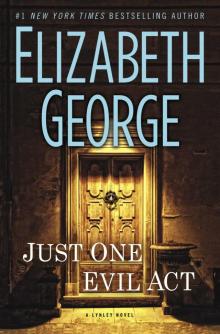 Just One Evil Act
Just One Evil Act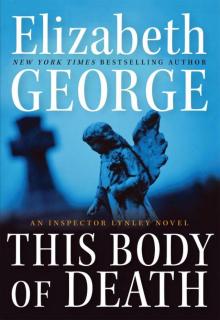 This Body of Death
This Body of Death The Edge of the Water
The Edge of the Water For the Sake of Elena
For the Sake of Elena Believing the Lie
Believing the Lie The Edge of the Shadows
The Edge of the Shadows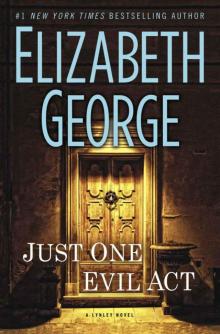 Just One Evil Act: A Lynley Novel
Just One Evil Act: A Lynley Novel In Pursuit of the Proper Sinner
In Pursuit of the Proper Sinner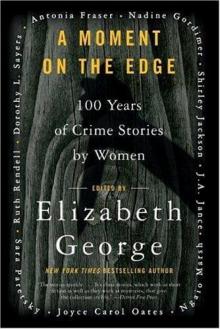 A Moment on the Edge:100 Years of Crime Stories by women
A Moment on the Edge:100 Years of Crime Stories by women Elizabeth I
Elizabeth I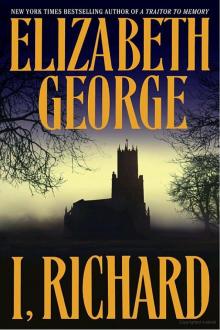 I, Richard
I, Richard A Traitor to Memory
A Traitor to Memory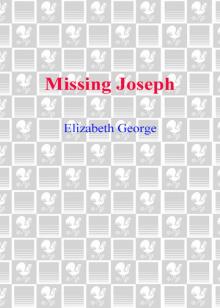 Missing Joseph
Missing Joseph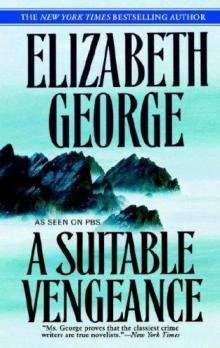 A Suitable Vengeance
A Suitable Vengeance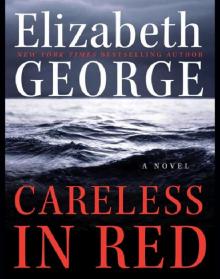 Careless in Red
Careless in Red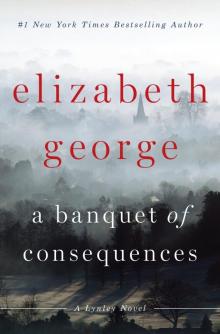 A Banquet of Consequences
A Banquet of Consequences Playing for the Ashes
Playing for the Ashes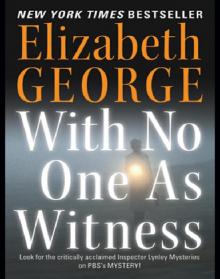 With No One As Witness
With No One As Witness Deception on His Mind
Deception on His Mind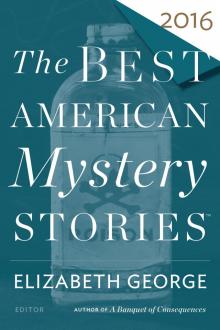 The Best American Mystery Stories 2016
The Best American Mystery Stories 2016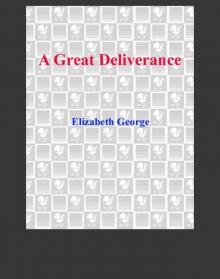 A Great Deliverance
A Great Deliverance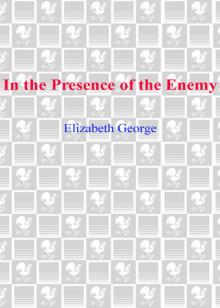 In the Presence of the Enemy
In the Presence of the Enemy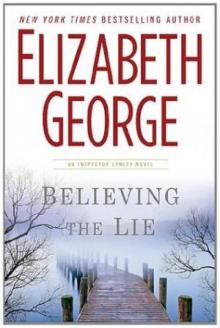 Believing the Lie il-17
Believing the Lie il-17 The Edge of the Light
The Edge of the Light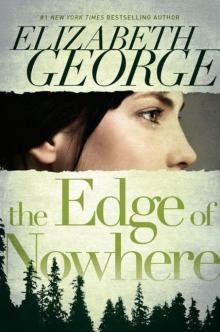 SW01 - The Edge of Nowhere
SW01 - The Edge of Nowhere A Place of Hiding
A Place of Hiding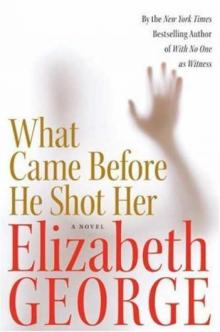 What Came Before He Shot Her il-14
What Came Before He Shot Her il-14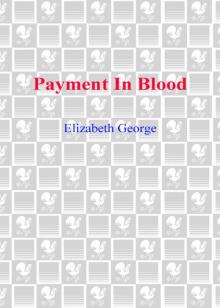 Payment In Blood
Payment In Blood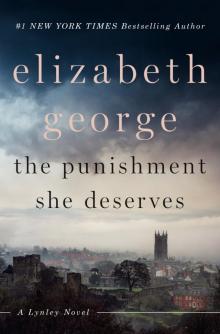 The Punishment She Deserves
The Punishment She Deserves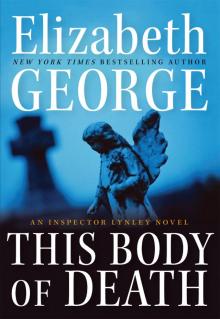 This Body of Death: An Inspector Lynley Novel
This Body of Death: An Inspector Lynley Novel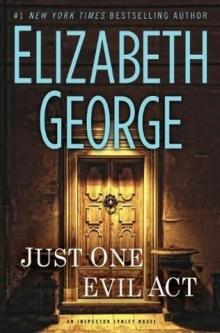 Just One Evil Act il-18
Just One Evil Act il-18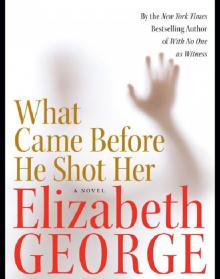 What Came Before He Shot Her
What Came Before He Shot Her Missing Joseph il-6
Missing Joseph il-6